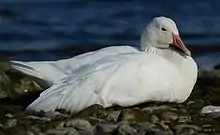אווז
Hebrew

אווז לבן (“A white goose”)
| Root |
|---|
| א־ו־ז (ʾ-w-z) |
Noun
אווז / אַוָּז \ אֲוָז • (aváz) m (plural indefinite אווזים / אַוָּזִים \ אֲוָזִים, singular construct אווז / אַוַּז \ אֲוַז־, plural construct אווזי / אַוָּזֵי \ אֲוָזֵי־, feminine counterpart אווזה / אַוָּזָה \ אֲוָזָה) [pattern: קַטָּל]
- goose
- a. 425 C.E., Jerusalem Talmud, Avodah Zarah 4:
- רִבִּי בָּא בְשֵׁם רִבִּי שְׁמוּאֵל אַװָז עִם אַװַז מִדְבָּר כִּלְאַיִם זֶה בְזֶה.
- Ríbi Ba v-shém ríbi Shmuél: aváz 'im aváz midbár kiláyim zeh v-zeh.
- R. Ba in the name of R. Shmuel said: A goose and a desert goose are different species.
- a. 425 C.E., Jerusalem Talmud, Avodah Zarah 4:
Usage notes
- The vowelization for all forms of this word varies, it is spelled with either a patákh (אַ) or a khatáf-patákh (אֲ) under the alef. The forms with full patákh place a dagésh in the vav.
Derived terms
References
- “אווז” in the Hebrew Terms Database of the Academy of Hebrew Language
Further reading
 אווז on the Hebrew Wikipedia.Wikipedia he
אווז on the Hebrew Wikipedia.Wikipedia he
This article is issued from Wiktionary. The text is licensed under Creative Commons - Attribution - Sharealike. Additional terms may apply for the media files.